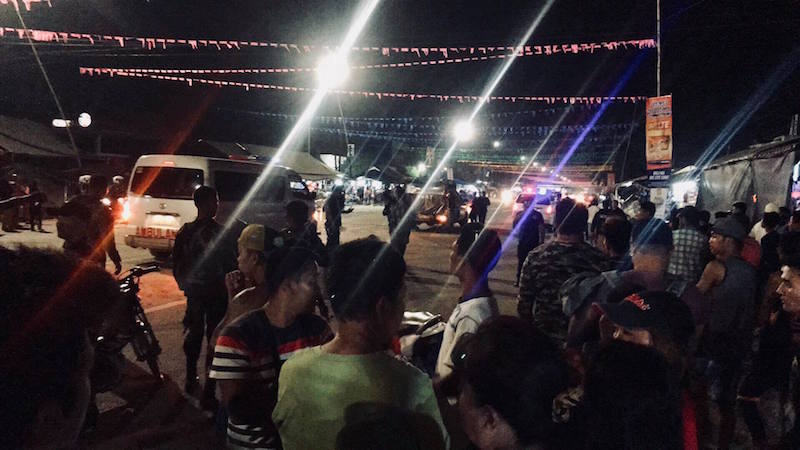DAVAO CITY (MindaNews / 31 August) — Defense Secretary Delfin Lorenzana does not see enough reason to extend martial law for the third time beyond December 31, 2018, despite the August 28 bombing in Isulan, Sultan Kudarat that left three persons dead and at least 30 others wounded.
“Not enough reason yet as of now,” Lorenzana told MindaNews in a text message late Thursday night. But he acknowledged that “the clamor from the citizens to extend martial law is persistent.”
MindaNews asked Lorenzana if what happened in Isulan was a “failure of intelligence or failure to appreciate intelligence,” given that martial law is still in place Mindanao-wide and security was supposed to have been tight in the town celebrating its 61st anniversary and 7th Hamungaya Festival.
An improvised bomb exploded along the national highway in Isulan, Sultan Kudarat at around 8:34 p.m. on August 28 just as a military truck passed by.
“We don’t know… Our security people are not doing their jobs,” Lorenzana replied.
 An ambulance arrives to bring the wounded to the hospital on Tuesday, 28 August 2018 in Isulan, Sultan Kudarat. An improvised bomb went off at 8:34 p.m. killing one and injuring at least 33 others. Two of the injured later passed away ln the hospital. Photo courtesy of PETER EVANGELISTA
An ambulance arrives to bring the wounded to the hospital on Tuesday, 28 August 2018 in Isulan, Sultan Kudarat. An improvised bomb went off at 8:34 p.m. killing one and injuring at least 33 others. Two of the injured later passed away ln the hospital. Photo courtesy of PETER EVANGELISTA
On May 23, 2017, at the press conference in Moscow where it was announced that martial law had been declared all over Mindanao due to the siege in Marawi, Lorenzana said there was no failure of intelligence on the part of the government forces in Marawi but a failure to appreciate intelligence.”I don’t think there is a lapse of intelligence. It’s just appreciation of the intelligence that was lacking there,” he said then.
Capt. Arvin Encinas, spokesperson of the 6th infantry Division, did not respond directly to the question if what happened in Isulan was a failure of intelligence or failure to appreciate intelligence.
“In as much as we wanted to secure the area, we still need the support of the population. Security is not only the sole responsibility of the AFP (Armed Forces of the Philippines) and PNP (Philippine National Police), dapat tulong-tulong po ang bawat isa” (everyone should help), Encinas told MindaNews late Thursday night.
“Your utmost cooperation is an added strength to our police and soldiers designated to facilitate the security of Isulan and the province of Sultan Kudarat,” Encinas added.
He said they are collaborating with the provincial police that is leading the investigation and security operations and with the local government officials of Isulan, Sultan Kudarat on the overall security changes that will be implemented in the town.
“The AFP will continue to support the local government of Isulan in its security operations in the area to ensure the safety and security of our citizens and maintain peace especially during public activities and celebrations,” he said.
Encinas said there were no discussions yet on extending martial law. “Di po pinag-usapan yan dito” (that was not discussed here), he said.
The 1987 Constitution under Article VII, Section 18 provides that whenever it becomes necessary, “un case of invasion or rebellion, when the public safety requires it,” the President may, for a period not exceeding sixty days, suspend the privilege of the writ of habeas corpus or place the Philippines or any part thereof under martial law.”
Proclamations 55 and 216
President Rodrigo Duterte issued Proclamation 216 on May 23, 2017, placing the entire Mindanao — all 27 provinces and 33 cities — under martial law for a period not exceeding 60 days. He also suspended the privilege of the writ of habeas corpus.
The declaration came barely eight hours after the first shots were fired between government forces and the Islamic State-inspired Maute Group and its allies, after a failed attempt by authorities to serve the warrant of arrest on Abu Sayyaf leader Isnilon Hapilon.
Duterte declared martial law even as Mindanao and the rest of the country were still under a State of National Emergency “on account of lawless violence in Mindanao” through his Proclamation 55. The President signed the proclamation on September 4, 2016, two days after the Roxas night market bombing in Davao City that left 15 persons dead and 69 others injured.
In July 2017, before the lapse of 60 days, Duterte asked Congress to extend martial law until yearend 2017. In December, the President again asked Congress to extend it until yearend 2018, even as he had declared Marawi City “liberated from the terrorist influence” on October 17, 2017 and all combat operations in Marawi were terminated by Lorenzana on October 23, exactly five months to the day the Marawi Siege began.
Extension as option
ABS-CBN News reported that when Executive Secretary Salvador Medialdea was asked Wednesday if Malacanang would seek another extension of martial law, he replied, “not necessarily.”
“We will see how it goes. It’s an option. We are trying to make it as easy as possible. If these things happen, what will we do? We’ll just sit around?” Medialdea said, adding “these are not good signs. Lives and limbs are in danger. Imagine, you are attending a festival and you get bombed?”
 President Rodrigo Duterte confers with Executive Secretary Salvador Medialdea and Special Assistant to the President, Christopher Bong Go, as he declared martial law in Mindanao amidst attacks perpetrated by the Isis-backed Maute Group. (Caption and photo posted from Moscow by Assistant Secretary Joseph Lawrence Garcia in a Viber group Tuesday, 23 May 2017)
President Rodrigo Duterte confers with Executive Secretary Salvador Medialdea and Special Assistant to the President, Christopher Bong Go, as he declared martial law in Mindanao amidst attacks perpetrated by the Isis-backed Maute Group. (Caption and photo posted from Moscow by Assistant Secretary Joseph Lawrence Garcia in a Viber group Tuesday, 23 May 2017)
Presidential Spokesperson Harry Roque in his press briefing in Malacanang on Wednesday, said the time to ask Congress for an extension is still in December. “At ang rekomendasyon po ng mga kasundaluhan ang pakikinggan ng ating Presidente” (And the President will consider the recommendation of the security setor).
For now, he said, it is still too early. “Let’s observe first and wait for the recommendation of the security sector,” Roque said.
Speaker Gloria Macapagal-Arroyo had assured the support of the House of Representatives should the President seek an extension.
Asked by a Malacanang reporter if what happened inIsulan speaks of the effectiveness of martial law in Mindanao, Roque replied: “I think it’s premature to say because — in fairness this is the second incident that we’ve had in Mindanao ‘no since martial law was declared, the first being in Basilan and the second being in Isulan. So tingnan po muna natin and I am not in a position to substitute my decision to that of the men on the grounds. So hintayin po natin ang rekomendasyon ng kasundaluhan natin dahil sila po ang nasa ground.”
When the reporter followed up on what the Palace’s basis was to measure the effectiveness of martial law in Mindanao, Roque replied: “Well, mayroon naman pong basis ‘no, basehan para martial law. There has to be a rebellion, there has to be invasion. So titingnan po natin kung ang rebelyon ay naririyan pa.”
Neither martial law nor Bangsamoro law
Senator Panfilo Lacson, a former chief of the Philippine National Police said the Isulan bombing suggests that “neither martial law nor the Bangsamoro Organic Law could guarantee peace in Mindanao.”
“Instead, it is my view that the National Security Council and our ground security forces should take a hard look at their security plans and strategy especially in the South and try to avert the vicious cycle of talking peace with one tribal group while alienating the others,” he said in a statement.
He added the Moro Islamic Liberation Front (MILF) “came into being and became a dominant armed force in Mindanao after we dealt peace with the MNLF (Moro National Liberation Front). But as government discusses peace with the MILF, a breakaway group is sowing terror, referring to the Bangsamoro Islamic Freedom Fighters (BIFF) which was allegedly behind the Isulan bombing.
Lacson has filed a bill to enhance the Human Security Act of 2007. (Carolyn O. Arguillas / MindaNews)
